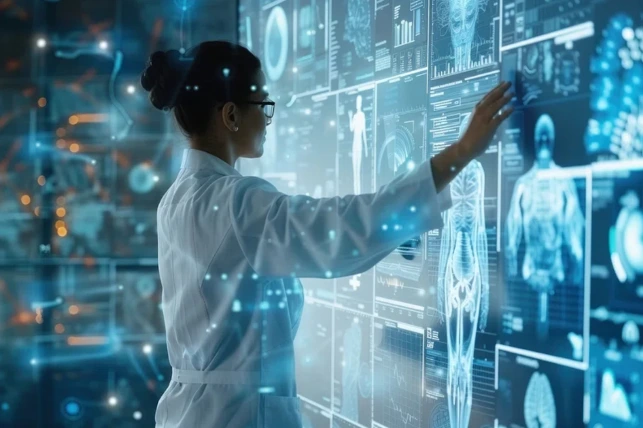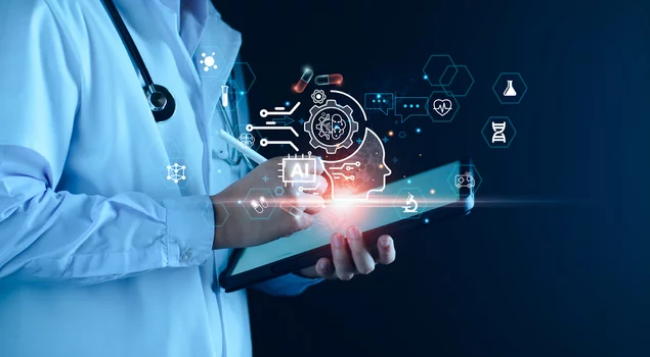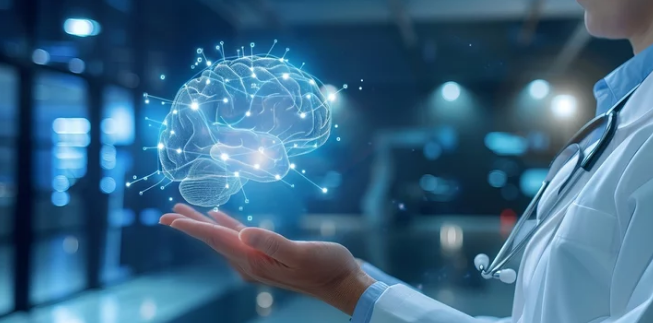Artificial Intelligence in Medicine
In recent years, artificial intelligence (AI) has emerged as a transformative force in healthcare, reshaping the landscape of medical diagnosis, treatment, and patient care. Through its remarkable capabilities in data analysis, pattern recognition, and decision-making, AI holds the promise of enhancing precision medicine, optimizing anesthesiology practices, improving medical device functionality, and revolutionizing healthcare delivery as a whole.
Using Artificial Intelligence to Transform Healthcare
Let's take a deeper dive into the advancements, challenges, and future prospects of AI in various aspects of medicine.

AI for Precision Medicine
Precision medicine, also known as personalized medicine, aims to tailor medical treatment and interventions to individual characteristics of each patient.AI plays a pivotal role in this domain by analyzing vast amounts of patient data, including genomic information, medical history, lifestyle factors, and environmental influences, to predict disease risk, identify optimal treatment strategies, and deliver targeted therapies.
AI Applications In Precision Medicine
In the realm of healthcare, artificial intelligence isn't just a tool; it's the architect of a future where precision, empathy, and efficiency converge to transform lives.
Artificial Intelligence in Anesthesiology
Anesthesiology is a critical field in medicine that requires precise dosing and monitoring to ensure patient safety during surgical procedures.
AI technologies are revolutionizing anesthesiology by providing advanced monitoring and decision support systems that enhance patient care and streamline workflow efficiency.

AI algorithms can analyze patient data in real-time, including vital signs, anesthesia drug dosages, and physiological parameters, to anticipate changes in patient condition and optimize anesthesia delivery.
By integrating machine learning models with anesthesia machines and monitoring devices, AI enables automatic adjustment of drug infusion rates and ventilation parameters, reducing the risk of adverse events and improving anesthesia management.
AI-powered predictive analytics in anesthesiology can assist clinicians in identifying patients at higher risk of complications or adverse reactions to anesthesia, allowing for preemptive interventions and personalized anesthesia plans. This proactive approach not only enhances patient safety but also contributes to improved surgical outcomes and recovery.
AI and Medical Devices
Medical devices play a crucial role in diagnosis, monitoring, and treatment across various medical specialties.
AI integration with medical devices holds immense potential for enhancing their functionality, efficiency, and accuracy in clinical settings.
AI algorithms embedded within diagnostic imaging systems, such as MRI and CT scanners, can analyze medical images with unprecedented speed and precision, enabling early detection of abnormalities and more accurate diagnosis of diseases. AI-powered wearable devices and remote monitoring technologies empower patients to track their health status in real-time and alert healthcare providers to potential issues, facilitating timely interventions and proactive healthcare management.
AI-driven robotics and automation are revolutionizing surgical procedures by augmenting the capabilities of surgeons and improving procedural outcomes. Surgical robots equipped with AI algorithms can perform complex tasks with precision and dexterity beyond human capability, minimizing surgical errors and reducing recovery time for patients.
AI in Drug Discovery and Development
Artificial intelligence is revolutionizing the drug discovery process, significantly reducing the time and cost associated with bringing new medications to market. Traditional drug development is often a lengthy and expensive endeavor, taking over a decade and costing billions of dollars.
AI accelerates this process by analyzing vast datasets to identify potential drug candidates, predict their efficacy, and assess safety profiles. Machine learning algorithms can sift through existing biomedical literature, clinical trial data, and chemical databases to uncover new therapeutic targets and optimize molecular structures. For example, AI has been instrumental in identifying promising compounds for diseases like COVID-19, where rapid response was crucial.
Additionally, AI-driven simulations can predict how drugs will behave in the human body, allowing researchers to prioritize the most promising candidates for further testing. This not only streamlines the development pipeline but also enhances the likelihood of successful outcomes, ultimately leading to more effective treatments for patients.

AI in Radiology and Medical Imaging
AI's integration into radiology has transformed how medical images are interpreted and utilized. Advanced algorithms, particularly deep learning models, are capable of analyzing imaging data from X-rays, MRIs, and CT scans with remarkable speed and accuracy. These AI systems assist radiologists by detecting subtle abnormalities that may be overlooked by the human eye, such as early signs of cancer or fractures.
For instance, AI algorithms can automatically segment and label structures within medical images, improving the efficiency of radiological assessments and reducing the workload on healthcare professionals. Moreover, AI enhances diagnostic accuracy by providing quantitative assessments of imaging characteristics, which can lead to more informed clinical decisions.
As a result, AI-powered medical imaging not only improves patient outcomes through earlier detection and intervention but also contributes to operational efficiencies within healthcare facilities.
AI in Predictive Analytics and Population Health Management
AI is increasingly being utilized in predictive analytics to enhance population health management and improve patient outcomes. By analyzing large datasets from electronic health records (EHRs), wearable devices, and social determinants of health, AI algorithms can identify trends and risk factors associated with various health conditions.
For example, predictive models can forecast which patients are at higher risk for hospital readmissions, enabling healthcare providers to implement targeted interventions to prevent these occurrences. Additionally, AI can analyze patterns in community health data to identify outbreaks or health disparities, allowing public health officials to allocate resources more effectively and develop targeted health initiatives.
This proactive approach to healthcare not only improves individual patient care but also enhances overall community health by addressing systemic issues and promoting preventive care strategies.
Using AI in Medicine
Beyond specific applications in precision medicine, anesthesiology, medical devices, drug discovery, radiology, and predictive analytics, AI is transforming healthcare delivery across the entire continuum of care. From streamlining administrative tasks and optimizing resource allocation to improving clinical decision-making and patient outcomes, AI is reshaping the way healthcare is delivered and experienced. One of the primary benefits of AI in healthcare is its ability to analyze vast amounts of medical data, including electronic health records, medical imaging studies, and clinical notes, to extract actionable insights and support evidence-based decision-making. AI-powered decision support systems provide clinicians with personalized treatment recommendations, drug interactions alerts, and diagnostic assistance, ultimately enhancing the quality and efficiency of patient care.
AI-driven telemedicine platforms and virtual care solutions are expanding access to healthcare services, particularly in underserved or remote communities. By leveraging AI algorithms for remote patient monitoring, virtual consultations, and predictive analytics, healthcare providers can deliver timely interventions and proactive management to patients regardless of geographic location, thereby improving health outcomes and reducing healthcare disparities.
Artificial intelligence holds immense promise for revolutionizing medicine and healthcare in profound ways. From advancing precision medicine and transforming anesthesiology practices to enhancing medical device functionality and optimizing healthcare delivery, AI is driving innovation across the entire healthcare ecosystem. As AI technologies continue to evolve and mature, their integration into clinical practice holds the potential to improve patient outcomes, enhance efficiency, and ultimately, save lives. However, realizing the full potential of AI in medicine requires addressing challenges related to data privacy, algorithm bias, regulatory frameworks, and workforce readiness. By fostering collaboration between healthcare professionals, researchers, technology developers, and policymakers, we can harness the power of AI to create a healthier and more equitable future for all.
Machine Learning Artificial Intelligence News
https://machinelearningartificialintelligence.com
AI & ML



Sign Up for Our Newsletter